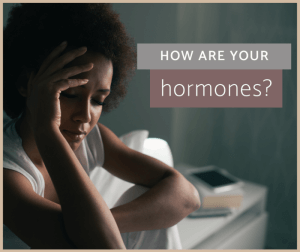
Hormones can have a massive impact on anxiety. Women may notice a correlation between their stress and anxiety level and pivotal points of their menstrual cycle.
Hormonal levels impact anxiety in a few ways:
- Normal levels of the “love” hormone oxytocin help to relieve anxiety. Oxytocin releases in response to touch, warmth, massage, fragrance, and positive social interaction. Excess of this hormone increases social anxiety.
- Low levels of estradiol (estrogen) in women increase anxiety (16).
- High levels of the androgen DHEA in males and females increase their social anxiety. (17)
- High or low levels of progesterone in women increase anxiety. (18, 19)
The symptoms of a hormonal imbalance are varied and can include:
Hair and Skin Changes due to Hormone Imbalance:
- Acne
- Hair loss
- Excessive facial or body hair
- Oily Skin
- Dry eyes, hair, or skin
Physical Issues Associated with Hormone Imbalance:
- Fatigue and sleep difficulties
- Weight gain or belly fat
- Hot flashes or night sweats
- Hypersensitivity to noise
- Headaches or migraines
- Low muscle mass
- Stomach upset
- Edema
- Hives
Sexual Dysfunction and Reproductive Problems:
- Infertility
- Irregular or heavy periods
- PMS
- Vaginal dryness
- Low libido
- Low sperm count or erectile dysfunction in men
- Spotting between periods
Mental Health Issues:
- Anxiety
- Depression
- Anger, irritability, aggression
- Memory deficits
- Psychosis
Medical Conditions:
- Fibroids, uterine polyps, endometriosis, PCOS
- Urinary tract infections
- Low bone density
- Hormone-related cancers
- Gynecomastia (breast enlargement in men)
- Prostate enlargement
Hormone Testing
We can measure hormone levels in blood, urine, and saliva. In women, hormones need to be measured at specific points of the menstrual cycle to be clinically useful, typically day 3 of the period (for estrogen) and day 21 of a 28-day cycle (for progesterone). The results need to be interpreted in context for these specific days of the cycle.
Blood Testing for Hormones
We need to interpret results carefully because lab ranges for hormones are so broad. Normal ranges are not based on optimal levels but on the unhealthy people that the lab has tested.
Urine Testing for Hormones
Urine testing looks at the hormone levels like estrogen and metabolites or breakdown products. Measuring this way shows an excess or deficiency and how your body is managing or processing your hormones. Naturopathic doctors often use this type of testing.
Saliva testing for Hormones
This type of measurement is useful to measure several samples over a day, a week, or a month. Hormones that have crossed cell membranes to appear in saliva better reflect biologically active hormones. It is convenient for the patient as it prevents the need for repeated trips to a lab, allowing for more of a complete cycle view. Naturopathic doctors often use this type of testing.
3 Steps to Improving Hormone Balance
Fixing an imbalance depends on the specific hormone that is out of whack. In general, the things that we know are good for us are also useful for hormone balance: a healthy, whole-food diet, daily exercise, stress management, and restful sleep.
Eat a healthy diet full of nutritious foods
Include foods like:
- leafy greens and legumes (Vitamin B6, folate)
- dark chocolate, cooked beans, almonds and other sources of magnesium
- cruciferous vegetables like broccoli, cauliflower, kale, and cabbage
- eggs, dairy, and meat for B12
Reduce your intake of refined carbs, sugar, rice, potatoes, cereal, bread, and pasta.
Also, specific vitamins, minerals, and herbs can balance the endocrine (or hormone-producing) system and enable healthy liver function. Your naturopathic doctor will determine appropriate supplementation.
Get regular, restful sleep
Sleep, or lack of it, influences hormone balance by affecting your resilience to stress. Lower resistance to stress raises cortisol, increases blood sugar and insulin levels. Insulin creates hormone imbalance. Even short-changing yourself of one hour a night leads to higher insulin levels the next day.
Hormone Balance and Exercise
Exercise reduces insulin levels. Lower insulin is better for hormone balance. High-intensity interval training is particularly useful for helping to reduce insulin. Make it a habit to exercise at some point every day. The benefits are extensive!
Hormone balance takeaways
- If you suspect your hormones are out of balance, it’s best to get tested to determine the source of the imbalance. Your naturopathic doctor can help you create a plan to fix the imbalance.
- Clean up your diet to the best of your ability, focusing on making every meal, mostly vegetables. Leafy greens and cruciferous vegetables are excellent choices for hormone balance.
- Aim for 7-8 hours of sleep per night, in concert with your body’s natural rhythm (asleep by 10-10:30 and up by 6:00-6:30 am).
This is the first of a 5-part series on how to manage anxiety naturally by addressing the root cause. For a concise summary, you can download my ebook for free for a limited time. Otherwise, look for weekly posts every Thursday. For one-on-one, personalized help with anxiety, book an appointment now.
Recommended for You
By Dr. Pamela Frank, BSc(Hons), Naturopathic Doctor
Dr. Pamela has practiced as a naturopathic doctor in Toronto since 1999. She has received numerous “Best Naturopath in Toronto” awards. She is registered with the College of Naturopaths of Ontario.
Dr. Pamela Frank uses a natural treatment approach that may include acupuncture, herbal medicine, nutrition, diet, vitamins, supplements, and other natural remedies to restore balance and provide long-term resolution to almost any health problem.
